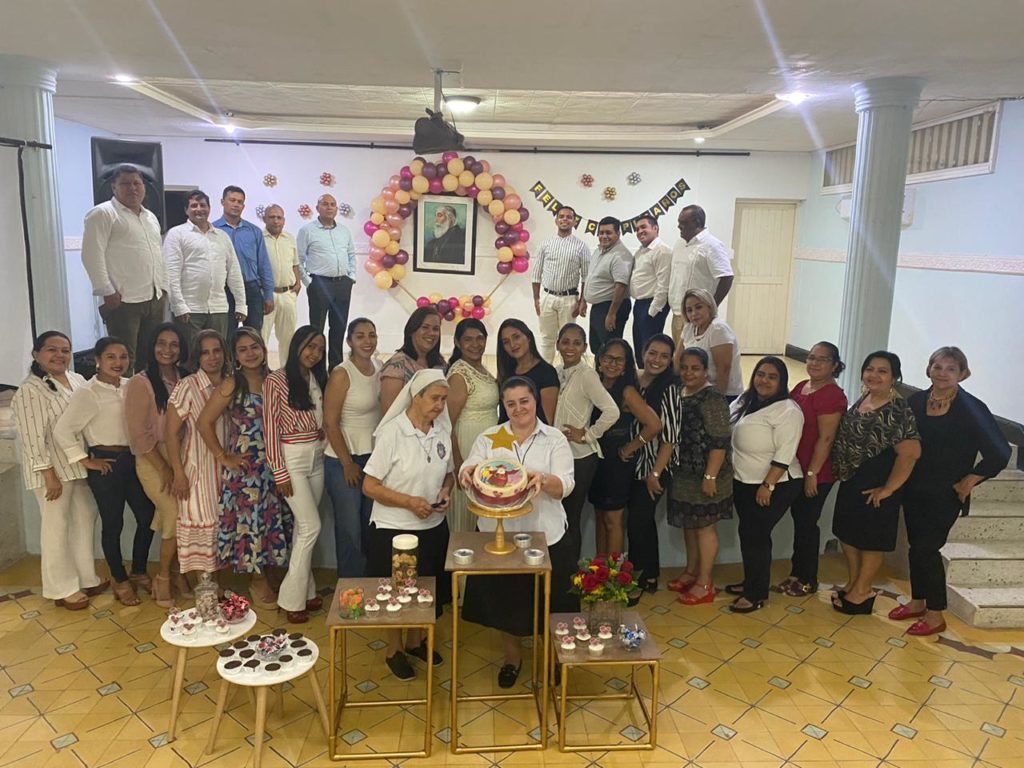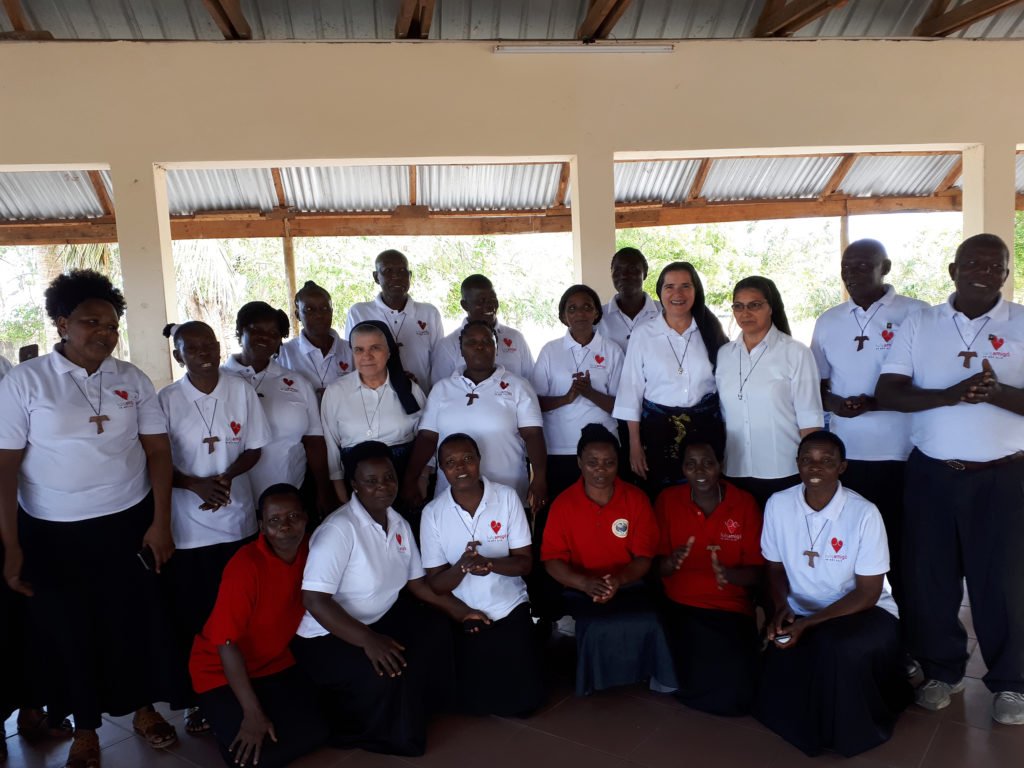As human beings we discover that we cannot walk alone and we need the others to grow humanly and spiritually. Because of that, as Pope Francis reminds us, we need to scrutinize the paths of accompaniment and formation, promoting processes leading to encourage growth in the Christian life (cf. EG 169).
The task of accompaniment and formation of lay people, may lead us to the temptation to look at the panorama with uncertainty and hopelessness but, Luis Amigó’s experience in this mission fills us with confidence, hope, and enthusiasm.
But, how did Luis Amigó carry out this mission? Let’s discover his pursuits, successes and limitations in this task, but, above all, his enthusiasm, perseverance and trust in God and inlay people that are responsible for their own process and committed to share the richness of Jesus Christ in their lives.
The human and spiritual vision of Father Luis takes its origin in a concept centered on the dignity of a person able to allow himself to be transformed and to transform the Church and the world he inhabits. We cannot forget that Luis Amigó, during his youth, was formed in some movements integrated into the secular Catholic spirituality and committed himself in a religious and social promotion of people, namely, the School of Christ and the Congregation of San Felipe Neri; that strongly affected his apostolate of accompaniment and formation of the laity, which generates a personal and social transformation. He so refers it in his writings: the Third Order is a Lord’s deed innovating the Church and completely transforming the society (cf. OCLA 1016-1017).
On the other hand, «man is created at image and likeness of God» (Gn 1,27) and so he owns the dignity of being son of God (cf. OCLA 1323); because of that, it is always necessary to work for the integral formation of the person. His formative accompaniment to lay people, more than a scientific, psychological or educational theory consists in a lifestyle expressed in a particular way of being, staying and evangelizing, striving to incarnate in his person and to instill in the life of the Christian, their baptismal obligation. For this reason, Father Luis frequently insisted on the wealth, nobility and dignity honoring and distinguishing us the Christians, who have been made children of God and heirs of his glory (cf. OCLA 1329).
The apostolate with the lay people was always present in the life of Fr. Luis, when he was still a simple Capuchin as well as when he was a bishop; he was well rooted in everyday life and was allowing himself to be enlightened by the human pedagogy that Jesus uses with his disciples: respect for the dignity of the person, listening to reality, use of a known, familiar and contextualized language, reading and interpretation of the Scriptures, closeness and affection for people.
Since his youth, he assumed accompaniment as something constantly present in his multiple formative activities, mainly in the congregations of the Venerable Third Order, the Daughters of Mary and the Luises (cf. OCLA 50). His concern for the formation of the young people of both associations was oriented towards the Christian life (cf. OCLA 2170) through an accompaniment that emerges as an imperative in the process of personal growth of the members of the groups and a human and spiritual wisdom integrated in the reality of his time, employed in daily life and proved by a true and convincing witness of Christian life.
The culminating moment of this apostolic service, occurred at the beginning of his priestly ministry, when he was appointed as Commissar of the Venerable Third Order, on October 20th, 1881 and entrusted with all the necessary faculties… (cf. OCLA 60-62). The footnote n. 39 referred to of OCLA 61, collects the opinion of Fr. Melchor de Benisa OFMCap regarding Father Luis’ apostolate in this area: “He had a great skill and a clinical eye in recognizing people who wished to enter the order and he was recommending to them no to make policy but, rather, to be extremely seraphic, as they were the right arm of the parish priest…”. He was interested about the formation of the Third Order members because he wanted to lead them to God, since his life witness and that is what his brothers acknowledged when they declared: “They were respecting him as a holy man and following his instructions with diligence and joy».
Father Luis promoted a formation that would affect the spiritual fervor of the members of those groups of the Third Order that «were rapidly spreading during the first years of the restoration and, in the year 1893 reached an amount of 17,864 Tertiaries, dependent on the Capuchin province of Toledo of which the Servant of God was one of the provincial Councilor » (cf. OCLA footnote n. 40).
Luis Amigó worked tirelessly in the progress and propagation of the Third Order, which was attended by a huge crowd of faithful; the organization of the groups strongly contributing to their growth, in such a way that, they became a considerable number of brothers and sisters… and that brought to mind the need to go on founding new congregations (cf. OCLA 61). He was also encouraging the members of the Third Order to participate in congresses as training opportunities as well as in other celebrations (cf. OCLA 2449).
During his episcopal ministry he wrote letters, circulars and apostolic exhortations requesting his priests, among others, to accompany and to form the Christian life of the lay people, with apostolic zeal and a tireless evangelical activity (cf. OCLA 1137). All that expresses his concern for the formation in the spiritual life and his commitment with great zeal and interest for the salvation of souls and to make known and loved by all Jesus Christ (cf. OCLA 1142-1143) as well as the tireless work and the restoration of the society turned away from Jesus Christ. In order to reach this aim, he was asking lay people of both sexes to work hard since, usually, persons pay more attention to them, that to the priests (cf. OCLA 1147), he was considering himself a collaborator of Jesus the Good Shepherd to attract the “lost sheep” into the fold, leading them to the field of the Church where they can be satisfied with the Jesus Christ’s doctrine (cf. OCLA 1136). He was as well caring about the formation of Christian families as a support and sustainer of society, fixing their eyes on the model of the Family of Nazareth (cf. OCLA 1102-1103) and paying attention to the reality interpreting it in the light of the faith and discerning his decisions about economic, social, moral and spiritual difficulties that society was experiencing (cf. OCLA 297 and 1054). He promoted also the advancement of science, whose source and origin is God, as a means of progress for peoples (cf. OCLA 936), the building of the peace and justice emanating from God’s mercy (cf. OCLA 656-657) and the construction of a more humane society where the graces and favors received from God should be used for the benefit of others, considered neighbor and brother (cf. OCLA 1051). These and many other concerns, made Luis Amigó a man committed to accompany and train well immersed in the Christian, social, political, economic reality and in the transformation of the society founded on charity and on Jesus Christ’s doctrine.
In addition to all that, we could say that Luis Amigó was a man able to glimpse the important role of the laity in the Church and in the society and to appreciate the need of walking together in synodality in order to build the God’s Kingdom and that is what the Church remembers us at the present time. In his writings he reflects this idea saying that” lay people are obliged to work, each one in his own sphere of activity, in spreading the faith and making Jesus Christ and his holy doctrine, known to men” (cf. OCLA 1147); through these words, he put into evidence the great importance of the secular apostolate We know that, his relationship with them was favored by a join active and responsible participation in events, celebrations and organized activities, both in the spiritual and civil fields.
Today we, the Capuchin Tertiary Sisters, feel urged to share with the lay people the gift of our Charism (cf. Const. 63), a gift of the Spirit for the whole Church and for the extension of the Kingdom, to promote since the novelty of the Holy Spirit and of Father Luis a formative accompaniment as a processual and integral dynamic, using the pedagogy of Christ the Good Shepherd, an feature speaking us of the profound experience of Jesus caring for each one of his sheep, to seek paths that open us to a new mentality, to walk alongside the lay people and to promote different ways of being and staying moved to compassion by mercy, no-appropriation and inclusion.
Sr. MARÍA ANABELLE CÉSPEDES MORALES, TC





